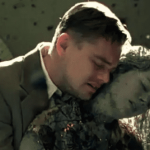 Weird Stuff
Weird Stuff  Weird Stuff
Weird Stuff  Movies and TV
Movies and TV 10 Weird Ways That TV Shows Were Censored
 Our World
Our World 10 Places with Geological Features That Shouldn’t Exist
 Crime
Crime 10 Dark Details of the “Bodies in the Barrels” Murders
 Animals
Animals The Animal Kingdom’s 10 Greatest Dance Moves
 Movies and TV
Movies and TV 10 Box Office Bombs That We Should Have Predicted in 2025
 History
History 10 Extreme Laws That Tried to Engineer Society
 History
History 10 “Modern” Problems with Surprising Historical Analogs
 Health
Health 10 Everyday Activities That Secretly Alter Consciousness
 History
History Top 10 Historical Disasters Caused by Someone Calling in Sick
 Weird Stuff
Weird Stuff 10 Wacky Conspiracy Theories You Will Need to Sit Down For
 Movies and TV
Movies and TV 10 Weird Ways That TV Shows Were Censored
 Our World
Our World 10 Places with Geological Features That Shouldn’t Exist
Who's Behind Listverse?

Jamie Frater
Head Editor
Jamie founded Listverse due to an insatiable desire to share fascinating, obscure, and bizarre facts. He has been a guest speaker on numerous national radio and television stations and is a five time published author.
More About Us Crime
Crime 10 Dark Details of the “Bodies in the Barrels” Murders
 Animals
Animals The Animal Kingdom’s 10 Greatest Dance Moves
 Movies and TV
Movies and TV 10 Box Office Bombs That We Should Have Predicted in 2025
 History
History 10 Extreme Laws That Tried to Engineer Society
 History
History 10 “Modern” Problems with Surprising Historical Analogs
 Health
Health 10 Everyday Activities That Secretly Alter Consciousness
 History
History Top 10 Historical Disasters Caused by Someone Calling in Sick
10 Movies That Accurately Portray Mental Health Issues
Mental health has been stigmatized for decades. As television and film creators begin to incorporate mental health more often into their projects, the layers of the stigma are slowly being pulled back. However, if mental health struggles are not portrayed accurately, it can often stigmatize them even more. In the past, characters struggling with mental illness were often trivialized or utilized as a part of the plot.
It is crucial that film creators depict mental health issues in an accurate light that doesn’t make the characters seem “weird” or “quirky.” Mental health is not a trend; it is something that people struggle with every single day. Here are 10 movies that most accurately portray the struggles of mental health.
Related: Top 10 Realistic Psychopaths In Movies
10 Beautiful Boy (2018)
Based on a true story, Beautiful Boy is about a young man named Nic who is struggling with drug addiction and his father, David, who wants to do everything in his power to help him. Both Timothee Chalamet and Steve Carell deliver genuine, heartbreaking performances that truly depict how addiction can take over one’s entire life.
Unlike other films about addiction, Beautiful Boy explores the frustrations and resistance to getting help. It features the raw reality that is rock bottom for many people struggling with severe drug addiction. Specifically, this film focuses on how the family of a loved one is affected and how helpless it can feel as a parent with a child who doesn’t want to get better.
This film does an excellent job of depicting all the different aspects of drug addiction. It shows Nic’s changes in his physical appearance, mood swings, mental function, and creating interpersonal relationships, which are all clear shifts in behavior for someone struggling with addiction.[1]
9 The Perks of Being a Wallflower (2012)
The Perks of Being a Wallflower is a coming-of-age film about an incoming high school freshman named Charlie, played by Logan Lerman, who becomes friends with two seniors named Sam and Patrick, played by Emma Watson and Ezra Miller.
Early on in the film, Charlie reveals that his Aunt Helen died in a car crash when he was seven years old. Throughout the rest of the film, Charlie has a series of flashbacks that slowly uncover the horrifying truth that his Aunt Helen had sexually abused him as a child. This sends him into an emotional spiral where he isolates himself completely and ends up in the hospital. Charlie spends about two months at the mental hospital, where he slowly comes to terms with his trauma and who he is as a person.
Capturing the realities of PTSD, sexual abuse, and trauma is not an easy task, but The Perks of Being a Wallflower does it almost flawlessly. It is one of the only films that accurately portrays suppressed memories, a common symptom of PTSD. It shows how when the brain goes through a traumatic event, it hides the memories so they cannot be accessed when in a normal state of consciousness.[2]
8 Silver Linings Playbook (2012)
Bipolar disorder is one of the most misrepresented mental illnesses in film. Stereotypes that coincide with bipolar disorder often include violence, unpredictability, and persistent negative thinking. And while these symptoms can be true for some people, they cannot be attributed to every person with bipolar disorder.
However, Pat, played by Bradley Cooper, does tend to adopt some of these symptoms in the film. After being released from a psychiatric hospital for a violent attack on the man his wife was having an affair with, he meets Tiffany, played by Jennifer Lawrence, a recently widowed woman who is also suffering from bipolar disorder.
Although both of the main characters share the same disorder, they experience their mental illness very differently. This film does a spectacular job of showing what different types of bipolar disorder look like, including both manic and depressive episodes.[3]
7 Inside Out (2015)
A kid’s movie accurately depicting mental illness may surprise you, but Inside Out hits the nail right on the head. This animated film follows Riley, who is going through many life changes, including moving across the country with her family and attending a new school. Although Riley is the main character, the real stars of the show are the emotions inside her head: Sadness, Fear, Disgust, Joy, and Anger.
This film focuses on how we cope with our emotions, which is a struggle for a lot of young adults and adolescents struggling with mental illness. It teaches us about the importance of emotional balance and how avoiding our emotions rarely works because emotions with negative connotations, like sadness and anger, are inevitable.[4]
6 It’s Kind of a Funny Story (2010)
Based on the young adult novel, It’s Kind Of A Funny Story is about a high school junior named Craig who checks himself into a psychiatric hospital due to his suicidal tendencies. He assumes the hospital will do a quick wellness check, make sure he’s okay, and send him on his way. However, he is legally obligated to spend at least a week there…or until he gets signed out by the medical team.
Craig meets a variety of different people in the mental hospital, but the main two that become part of his journey are played by Zach Galifianakis and Emma Roberts. Topics such as suicide attempts and self-harm are incorporated into this film in a careful but meaningful way. It shows the realities of recovering from any mental illness while thoughtfully incorporating humor to destigmatize the idea that all people suffering are totally miserable to the outside world.
The original author of It’s Kind of a Funny Story, Ned Vizzini, ended up committing suicide in 2013 after suffering from years of depression. This story was based on his stay in a mental health hospital in 2004.[5]
5 Black Swan (2010)
Black Swan is a dark drama that explores self-injury, disordered eating, and psychotic breaks. It follows the story of a ballerina named Nina, played by Natalie Portman, who gets the lead role in Swan Lake. In this production, she must be able to capture both the beauty of the white swan and the darkness of the black swan. Personifying these characters sends her into a psychotic spiral that is detrimental to her well-being.
For a lot of the film, Nina experiences delusions where she doesn’t know what is real and what is fake. One scene in the movie shows Nina discovering bleeding scratches on her arm, assumably from self-harm. Because of Nina’s hallucinations, we never really know what is real, either.
Throughout the movie, Nina deals with several disordered behaviors, including anxiety, OCD, disordered eating, and delusional thinking. While her disordered behavior was never diagnosed in the film, we can safely assume it’s some type of personality disorder, which is when you have a rigid and unpredictable pattern of thinking.[6]
4 Girl, Interrupted (1999)
Girl, Interrupted is one of the most well-known films to tackle borderline personality disorder. Borderline personality disorder impacts the way a person views themselves and others, causing problems functioning in everyday life. Susanna Kaysen, played by Winona Ryder, is being treated for BPD after being admitted to a psychiatric ward.
One of the patients Susanna meets in the ward is named Lisa. Lisa, played by Angelina Jolie, is a diagnosed sociopath, some of her symptoms being manipulation and deceit. This is another personality disorder called antisocial personality disorder, which causes a person to have no regard for what is right and wrong.
Some of the scenes in this movie are horrifyingly accurate, like Lisa mocking another patient for being sexually assaulted and showing no remorse for her behavior. The film highlights the severity of certain personality disorders and how they can impact one’s life in such a negative way. It is one of the only films where we get to see someone with sociopathic tendencies not being inherently violent or even homicidal.[7]
3 To the Bone (2017)
To the Bone is about a 20-year-old young woman named Ellen, played by Lily Collins, who suffers from severe anorexia nervosa. She has been in and out of different treatment centers, relapsing immediately after being released from each of them. As a last resort, she is admitted to a group home recovery center with six other patients.
At first, Ellen is extremely resistant to treatment, which is a common symptom for people with eating disorders. Psychologically, the habits created by having an eating disorder become a coping mechanism which is clearly shown in Ellen’s resistance to getting better.
This film does a brilliant job of portraying different eating disorders other than anorexia nervosa. There are characters in the film who suffer from bulimia nervosa and binge eating disorder as well. It is important to recognize that not all eating disorders involve body image and self-starvation. However, this film highlights these symptoms in a non-glamorizing way which should definitely be applauded.[8]
2 Little Miss Sunshine (2006)
Another film that accurately portrays mental health is Little Miss Sunshine. The story follows a family traveling across the country in their van, persistent on getting their young daughter to her beauty pageant. Although this lighthearted film is cute and funny, it has a layer of seriousness to it as it talks about major depressive disorder.
One of the main characters is Uncle Frank, played by Steve Carell. In this film, Frank is out of a job and dealing with emotional turmoil from his relationship, causing him to attempt to take his own life. Since his insurance wouldn’t pay for treatment, he is placed in the care of Sheryl, played by Toni Collette.
Although Frank is dealing with depression and suicidal tendencies, he seems to have the most compassion for his family throughout the movie. This shows that people suffering from depression are not always miserable on the outside, and they often mask or smile through their emotional pain.[9]
1 The Dark Knight (2008)
Finally, we have The Dark Knight. Heath Ledger prepared for his role as the Joker by isolating himself in a hotel room for six weeks before filming. His preparation definitely shined through in the film, as his character was visibly deranged and experiencing psychotic behavior.
Throughout various scenes in the film, we see Ledger acting violent, emotionless, and isolated, which are all symptoms of psychopathy. There is a fine line between correctly and incorrectly incorporating mental health in the horror/thriller genre. One of the things this film does correctly highlights how past trauma can manifest itself in violent and disturbing ways. It focuses on generational trauma and how difficult it is to break that harmful cycle
Joker (2019) provides another glimpse into mental health. But this time, the Joker(played by Joaquin Phoenix) has feelings of persecution and delusions consistent with the mental disorder paranoid schizophrenia. The Joker’s descent into madness in the film portrays the psychological torment he falls under, making it troubling and difficult to watch.[10]








